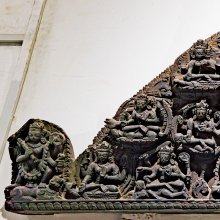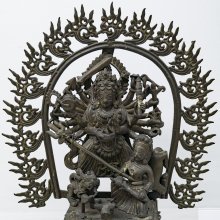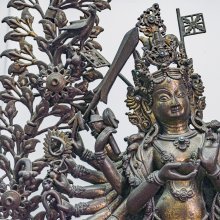Asura, Asūra, Āsura, Asurā: 38 definitions
Introduction:
Asura means something in Buddhism, Pali, Hinduism, Sanskrit, Jainism, Prakrit, the history of ancient India, Marathi, Hindi. If you want to know the exact meaning, history, etymology or English translation of this term then check out the descriptions on this page. Add your comment or reference to a book if you want to contribute to this summary article.
Asura has 38 English definitions available.
Alternative spellings of this word include Asur.
Images (photo gallery)
(+7 more images available)
Languages of India and abroad
Sanskrit dictionary
[Deutsch Wörterbuch]
Source: Cologne Digital Sanskrit Dictionaries: Böhtlingk and Roth Grosses Petersburger WörterbuchAsura (असुर):—
--- OR ---
Asūra (असूर):—(von 3. a + sūri) n. Abwesenheit eines Soma-Bereiters: a.ū.e santi sū.ayaḥ [Ṛgveda 8, 10, 4.]
--- OR ---
Āsura (आसुर):—(von asura)
1) adj. f. ī nach der doppelten Bedeutung von asura a) geistig, göttlich: tanū.apāducyate.garbha āsu.aḥ [Ṛgveda 3, 29, 11.] von Varuṇa [5, 85, 5.] ā.u.ī mā.ā (vgl. [Pāṇini’s acht Bücher 4, 4, 124]) [Vājasaneyisaṃhitā 11, 69.] [Atharvavedasaṃhitā 3, 22, 4.] — b) zu den bösen Geistern gehörig, ihnen geweiht, asurisch, dämonisch: yattvā sūrya.svarbhānu.tama.āvidhyadāsu.aḥ [Ṛgveda 5, 40, 5. 9.] namucāvāsu.e sacā [10, 131, 4.] [Vājasaneyisaṃhitā 19, 34.] kṛ.yāḥ [Atharvavedasaṃhitā 8, 5, 9.] [The Śatapathabrāhmaṇa 5, 3, 2, 2. 4, 1, 9.] prajāḥ [13, 8, 1, 5. 2, 1.] mantra [Kātyāyana’s Śrautasūtrāṇi 1, 10, 14.] tasmādapyadyehādadānamaśraddadhānamayajamānamāhurāsuro vateti [Chāndogyopaniṣad 8, 8, 5.] vivāha [Manu’s Gesetzbuch 3, 21. 24. 25. 9, 197.] dharma [3, 31.] sva [11, 20.] pura [Arjunasamāgama 10, 30.] janāḥ [Bhagavadgītā 16, 7.] bhāva [7, 15.] prakṛti [9, 12.] saṃpad [16, 4.] yoni [20.] [Prabodhacandrodaja 113, 19.] māyā [Mahābhārata 3, 765.] tamas [Daśaratha’s Tod 1, 2.] āsuravipralambhanāni (Sch.: = akṛtyacaraṇāni) [Daśakumāracarita 64, 3] v. u. —
2) m. a) = asura ein Asura, gaṇa prajñādi zu [Pāṇini’s acht Bücher 5, 4, 38.] f. āsurī [Atharvavedasaṃhitā 1, 24, 1. 2. 7, 38, 2.] [Aitareyabrāhmaṇa 2, 22] (dieselbe Belegstelle ist aus Versehen u. asura 4, a angegeben worden). — b) = āsuro vivāha (s. u. 1, b) [Śabdakalpadruma] Bei dieser Heirathsform erkauft der Bräutigam die Braut, indem er nach [Manu’s Gesetzbuch 3, 31] den Verwandten und der Braut soviel giebt, als er vermag. — c) pl. die Sterne der südlichen Hemisphäre [Sūryasiddhānta] [Kālasaṃkalita 355.] [Haughton.] — d) ein Fürst der Asura (eines Kriegerstammes) gaṇa paśvādi zu [Pāṇini’s acht Bücher 5, 3, 117]; vgl. [?Vārttika von Kātyāyana. 2 zu 4, 1, 177.] —
3) f. rī a) Chirurgie [Vaidyaka] und [Śabdacandrikā im Śabdakalpadruma] — b) schwarzer Senf, Sinapis ramosa Roxb., [Amarakoṣa 2, 9, 19.] [Hemacandra’s Abhidhānacintāmaṇi 419.] —
4) n. a) Blut [Hemacandra’s Abhidhānacintāmaṇi 621.] — b) schwarzes Salz (viḍlavaṇa) [Rājanirghaṇṭa im Śabdakalpadruma]
--- OR ---
Asura (असुर):—
2) b) asurāṇāṃ chandāṃsi, asuracchandāṃsi [Prātiśākhya zum Ṛgveda 3, 275.] [Weber’s Indische Studien 8, 74. fg. 114. 116. 128.] — d) [Varāhamihira’s Bṛhajjātaka S. 5, 79.] — g) pl. Name einer Schule [Weber’s Indische Studien 3, 275.] —
4) a) [Śāṅkhāyana’s Brāhmaṇa 23, 4.] die Stelle [Aitareyabrāhmaṇa 2, 22] zu streichen, da hier āsurī (vgl. u. āsura 2, a) vorauszusetzen ist. — b) lies ramosa st. racemosa.
--- OR ---
Āsura (आसुर):—
1) a) āsurī māyā auch [Kāṭhaka-Recension 16, 7.] [Taittirīyasaṃhitā 4, 1, 9, 2.] — b) chandāṃsi (Gegens. daivyāni) [Prātiśākhya zum Ṛgveda 16, 2.] gāyatrī [Weber’s Indische Studien 8, 230. 232.] vivāha [ĀŚV. GṚHY. 1, 6, 6.] eines Schule (wohl von āsuri) [Weber’s Indische Studien 3, 259.] —
2) a) svarbhānurvā āsuraḥ sūryaṃ tamasāvidhyat [Kāṭhaka-Recension 11, 5.] rāvaṇa āsura [WEBER, Rāmatāpanīya Upaniṣad 297.] —
3) c) (sc. dvār) Bez. des penis (meḍhra) oder vielmehr der Harnröhre [Bhāgavatapurāṇa 4, 25, 52. 29, 14.] vulva [BURN.]
--- OR ---
Asura (असुर):—
1) c) [Z. 5 lies 63, 7. 3 Stenzler 63, 7, 3.]
Source: Cologne Digital Sanskrit Dictionaries: Sanskrit-Wörterbuch in kürzerer FassungAsura (असुर):——
1) Adj. geistig , unkörperlich , göttlich. —
2) m. — a) Geist , der höchste Geist (insbes. von Varuṇa). — b) böser Geist , Gespenst , Dämon , Widersacher der Götter. — c) Bez. Rāhu's. — d) *die Sonne. — e) *Wolke. — f) Pl. Nomen proprium — α) *eines Kriegerstammes. — β) einer Schule. —
3) *f. asurā — a) Nacht. — b) Zodiakalzeichen. —
4) f. asurī — a) ein weiblicher Unhold. — b) *Sinapis_ramosa Roxb.
--- OR ---
Āsura (आसुर):—1. —
1) Adj. (f. ī) — a) geistig , göttlich. — b) asurisch , dämonisch. —
2) m. — a) ein Asura. — b) *ein Fürst der Asura. — c) Pl. die Sterne der südlichen Hemisphäre. —
3) f. ī — a) weiblicher Dämon. — b) Chirurgie. — c) (sc. dvār) Harnröhre. — d) *Sinapis_ramosa Roxb. —
4) *n. — a) Blut. — b) Sochalsalz.
--- OR ---
Āsura (आसुर):—2. Adj. von Asuri stammend [Indische studien von Weber 3,259.]
Sanskrit, also spelled संस्कृतम् (saṃskṛtam), is an ancient language of India commonly seen as the grandmother of the Indo-European language family (even English!). Closely allied with Prakrit and Pali, Sanskrit is more exhaustive in both grammar and terms and has the most extensive collection of literature in the world, greatly surpassing its sister-languages Greek and Latin.
See also (Relevant definitions)
Starts with (+81): Acuracattuvam, Acurakuncaram, Acurakuru, Acuramanam, Acuramantiri, Acurappantikai, Acurar, Acurarratinton, Ashuracane, Ashurathiya, Ashuravas, Ashuraya, Asura Sutta, Asura Vagga, Asura-banda, Asura-kriya, Asura-vijayin, Asurabanda, Asurabhi, Asurabrahma.
Ends with (+159): Abhasura, Abhyasashura, Acchasura, Aghasura, Agrasura, Alamkarasura, Amdhasura, Anantamukhadevasuranetrasura, Andhakasura, Anuttarasura, Arambhashura, Arishtasura, Aryashura, Asahayashura, Atmavatashura, Attasura, Atyasura, Avasura, Badasura, Bajaramahashura.
Full-text (+2952): Asuraraj, Indrari, Kumbhanda, Asuraripu, Asurahva, Raktabija, Asurarakshasa, Asurakshayana, Asurendra, Asurabrahma, Devasura, Asuri, Asuratva, Bhurihan, Cakradrish, Kritantakalasura, Dhundhu, Kalakeya, Vatapi, Keshi.
Relevant text
Search found 243 books and stories containing Asura, Asūra, Āsura, Asurā, A-sura, A-sūra; (plurals include: Asuras, Asūras, Āsuras, Asurās, suras, sūras). You can also click to the full overview containing English textual excerpts. Below are direct links for the most relevant articles:
Shrimad Bhagavad-gita (by Narayana Gosvami)
Verse 16.6 < [Chapter 16 - Daivāsura-sampada-yoga]
Verse 7.15 < [Chapter 7 - Vijñāna-Yoga (Yoga through Realization of Transcendental Knowledge)]
Verse 11.22 < [Chapter 11 - Viśvarūpa-darśana-yoga (beholding the Lord’s Universal Form)]
The Markandeya Purana (by Frederick Eden Pargiter)
Canto LXXXIX - The Devī-Māhātmya: The slaying of Niśumbha
Canto LXXXVII - The Devī-Māhātmya: The slaying of Caṇḍa and Muṇḍa
Rig Veda (translation and commentary) (by H. H. Wilson)
Chaitanya Bhagavata (by Bhumipati Dāsa)
Verse 2.7.6 < [Chapter 7 - The Meeting of Gadādhara and Puṇḍarīka]
Verse 2.13.281 < [Chapter 13 - The Deliverance of Jagāi and Mādhāi]
Verse 3.2.187 < [Chapter 2 - Description of the Lord’s Travel Through Bhuvaneśvara and Other Placesto Jagannātha Purī]
Tiruvaymoli (Thiruvaimozhi): English translation (by S. Satyamurthi Ayyangar)
Pasuram 3.5.2 < [Section 5 - Fifth Tiruvaymoli (Moym mam pum polil)]
Pasuram 7.6.8 < [Section 6 - Sixth Tiruvaymoli (Pa maru muvulakum)]
Pasuram 1.6.3 < [Section 6 - Sixth Tiruvaymoli (Parivatu il icanai)]
Women in the Atharva-veda Samhita (by Pranab Jyoti Kalita)
6. Goddess Āsurī < [Chapter 4 - Female Deities and the Glorification of Women in the Atharvaveda]
31. Some Other Female Deities < [Chapter 4 - Female Deities and the Glorification of Women in the Atharvaveda]
6b. Hymn to Win the Love of a Husband < [Chapter 2 - The Strīkarmāṇi Hymns of the Atharvaveda]
Related products







